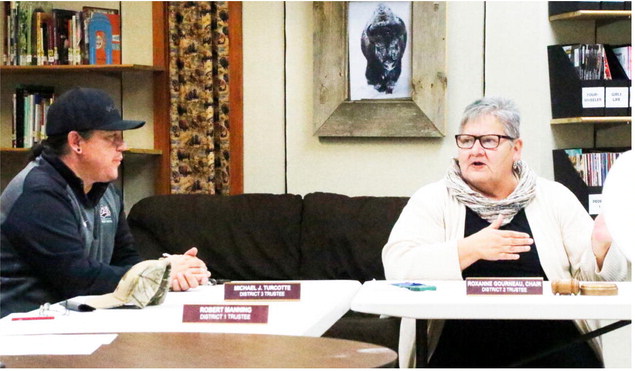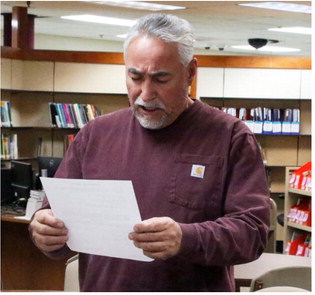Chief Justice Race Pits Two Views Of High Court Against One Another
Neither of the candidates for Chief Justice of the Montana Supreme Court thought they were destined for the highest court in the state. Instead, Jerry Lynch and Cory Swanson both say they decided to run because they saw the need for a candidate who offered a different judicial philosophy to the ones on the ballot.
The campaign has come to symbolize the state of the judiciary in Montana – is it a vital, independent branch that is under assault from the legislative and executive branch or is it an activist group undermining the work of elected officials in the state?
For Broadwater County Attorney Corey Swanson that means he wants to change to court to be less “activist” than it has been.
Swanson, 47, grew up in Montana and earned his law degree from the University of Montana. He is also a colonel in the National Guard with 27 years of service.
“I have pretty extensive experience leading large organizations in the military,” Swanson said, “and the leadership function of the Chief Justice requires a lot of work with a lot of people, and it requires not ordering them around, but really cooperation and convincing them to work together towards common good.”
After law school, Swanson became a partner in a law firm, deputy attorney general to Tim Fox, and eventually prosecutor for Broadwater County, where he has remained for ten years. He decided to enter the race after feeling dissatisfied with the platforms of the other candidates.
“I didn’t hear from their rhetoric, anyone that was focused on … what I think is the kind of stable, fundamental way of doing appellate judging, which is what the Supreme Court’s for,” Swanson said. “And so that was really what I was trying to do, is provide an advocacy for what I would call non activist methodology of interpreting the law and issuing cases.”
For Lynch, it was concerns that the judiciary has found itself under political attack from conservative lawmakers in the legislature and the executive branch that spurred him to enter the race.
“When I decided to run for the Supreme Court, I had a passion about defending the judiciary,” Lynch said in a candidate forum in Missoula on Sept. 12. “I retired as a federal judge, but the nonsense and the attack on the judiciary is something I just, I couldn’t just sit idly by.”
Lynch, 72, grew up Butte, and originally got a master’s degree from Montana State University in zoology and genetics. He then earned a law degree from the University of Montana and entered private practice in Great Falls, Montana, where he worked as a trial attorney.
“I am so proud of the years I spent as a trial attorney,” Lynch said. “Why? Because there’s always someone bigger than you. There’s always someone bigger than your business, and when you get in a fight with the bully, you need someone to protect you.”
Lynch was then appointed a Federal Magistrate judge, where he served for 15 years. He is quick to note he was appointed by both Democratic and Republican presidents, saying it showcases his ability to reach across the aisle.
Political observers said that Lynch’s campaign is built around defending the judiciary from political attack.
“His argument is that the institutions of Montana governance, including judiciary, are under attack, and the rule of law,” said Jeremy Johnson, a political science professor at Carroll College. “That’s certainly an argument that can be made in the Trump era.”
Lynch also emphasizes his support for the Montana constitution in his campaign. He focuses on that the right to privacy, a healthy environment and a quality education. The American Civil Liberties Union of Montana sent a mailer highlighting Lynch’s record and his support for abortion rights.
He added that he has no complaint with the current workings of the Montana Supreme Court, which he views as a moderate court.
It’s a position that has drawn support from many top lawyers in the state, including former Montana Supreme Court Associate Justice Pat Cotter who server from 2000-2016.
“We’re going to need a steady hand for Chief Justice,” Cotter said at a Helena event for Lynch. “And Jerry Lynch is that steady hand.”
Swanson comes to the campaign as a county prosecutor and he sees work to be done in connecting the high court to what is happening across the state, saying he wants to improve communications between district courts and the Montana Supreme Court, as well as administrative improvements such as enhanced courtroom security and increasing the number of oral arguments that the court hears per year.
He also stressed the need for the court to bring more consistency to the law.
“I’ve gotten a little frustrated with some of the ways that I think the court precedents have been overturned or applied in a way that I feel like doesn’t give fair notice to people in advance,” said Swanson. “I think there’s been some less predictability in the law than I’d like.”
Broadwater County Sheriff Nick Rauser, who is supporting Swanson, said he would welcome what he says would be a new perspective on the court.
“I don’t know whether the other members of the Supreme Court know what we deal with on a regular basis,” Rauser said. Swanson has also drawn the support of the Montana Chamber of Commerce, which said they felt he would help represent the interests of businesses in the court.
Swanson said his goal is to “take politics out of the equation,” by emphasizing apolitical judging and a stable, consistent judiciary.
Although these two candidates are running as nonpartisans for the Supreme Court, Carroll Professor Johnson noted their campaigns echo how Democrats and Republicans are talking about the courts.
“The Democrats’ point is that the institutions or judiciary, and presumably democracy, could be under a threat,” Johnson said, “and the Republicans are like, just get the politics out of it.”
Jessi Bennion, a professor of political science at Montana State University, said it can be hard for voters to gauge Swanson’s and Lynch’s viewpoints since judicial races are strictly non-partisan.
“I do think that if voters are savvy enough, they can figure out kind of how they lean whether it’s through their judicial philosophy or the groups that are supporting them,” Bennion said.

